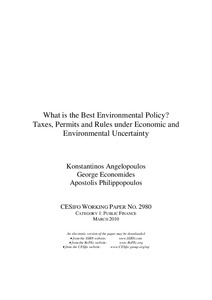What is the best environmental policy? Taxes, permits and rules under economic and environmental uncertainty
"We study the importance of uncertainty and public finance to the welfare ranking of three environmental policy instruments: pollution taxes, pollution permits and Kyoto-like numerical rules for emissions. The setup is the basic stochastic neoclassical growth model augmented with the assumption...
| Main Authors: | , , |
|---|---|
| Institution: | ETUI-European Trade Union Institute |
| Format: | TEXT |
| Language: | English |
| Published: |
Munich
2010
CESifo |
| Subjects: | |
| Online Access: | https://www.labourline.org/KENTIKA-19185276124919034589-What-is-the-best-environmental.htm |
| Summary: | "We study the importance of uncertainty and public finance to the welfare ranking of three environmental policy instruments: pollution taxes, pollution permits and Kyoto-like numerical rules for emissions. The setup is the basic stochastic neoclassical growth model augmented with the assumptions that pollution occurs as a by-product of output produced and environmental quality is treated as a public good. To compare alternative policies, we compute welfare-maximizing values for the second-best policy instruments. We find that, in all cases studied, pollution permits are the worst policy choice, even when their revenues finance public abatement. When the main source of uncertainty is economic, the most efficient recipe is to levy pollution taxes and use the collected tax revenues to finance public abatement. However, when environmental uncertainty is the dominant source of extrinsic uncertainty, numerical rules, being combined with tax-financed public abatement, are better than pollution taxes." |
|---|---|
| Physical Description: | 31 p. Digital |

